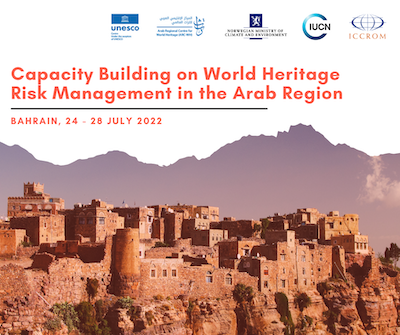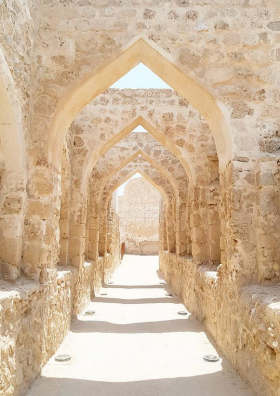The Arab region is home to invaluable and significant forms of cultural and natural heritage, ranging from collections of antiques and objects, ancient monuments, archaeological sites, historic buildings, towns, cities, cultural landscapes, unique ecosystems, habitats, to customs, relics, music, craftsmanship, traditional lifestyles, geological and ecological processes.
In recent years, unpredictable disasters caused by natural hazards, such as flooding, earthquakes, fires, and tropical storms have affected the region’s diverse heritage places. Human actions such as tourism, economic development and urban expansion dramatically impact on heritage. Furthermore, conflicts and political instability are also causing major threats to the protection of heritage places, with a huge impact on communities and their socio-economic and cultural life. These hazards can affect heritage at various levels, both locally, nationally, and regionally. Whether natural or human-induced, risks affect the physical condition and intangible aspects of heritage. As a result, intervention and action are needed to help protect the region’s heritage. Unfortunately, it can be difficult to restore heritage to its original state, and sometimes the damage is irreversible. Therefore, risk management of heritage is urgently needed.
For World Heritage sites, risk management is a crucial and indivisible component of policies and management strategies for heritage places and their larger contexts, and properties need to have in place effective Risk Management planning for World Heritage sites, which encompass effective strategies for mitigation, adaptation, and preparedness to reduce disaster risks will be raised and discussed. In addition, it is important to recognize the link between disasters and climate change, looking at ways of integrating climate change mitigation and adaptation strategies with risk management of cultural heritage.
This five-day course on risk management for the Arab region will introduce participants to the challenges and opportunities for building resilience of heritage places, including their people and local communities, through managing risks from various factors, including disasters and climate change. The course will serve as a platform for participants to share their knowledge and experiences on risk management in heritage places and to understand how risk-based thinking is an integral component of effective management of World Heritage properties and other heritage places. The course guides participants in the development of heritage management actions, considering multiple risk factors such as disasters, conflicts, and climate change from the larger natural setting for risk mitigation, adaptation and preparedness of heritage places including World Heritage Sites.
The course will provide the background for theoretical and policy framework to manage risks including those from conflicts, disasters, and climate change, as well as offer a range of hands-on practical methods for analyzing the wider range of risk factors and designing mitigation, adaptation, and preparedness strategies for specific case studies.
The course is organized by the Arab Regional Centre for World Heritage (ARC-WH) in cooperation with the ICCROM-IUCN World Heritage Leadership Programme (WHL).
Course venue and programme
The course will take place in English with Arabic support from 24 to 28 July 2022 at the Arab Regional Centre for World Heritage (ARC-WH) in Manama, Kingdom of Bahrain.
The course will be structured around the following overarching themes:
- Factors affecting heritage places: disasters, conflicts, and climate change
- Risk Management of heritage places
- Integrated methodology for Risk Assessment
- Strategies for Risk Mitigation, Adaptation and Preparedness
- Emergency Response & Post Disaster Recovery
- Implementing and monitoring Risk Management of heritage places
Participants
Participants will be made up of a maximum of 15 heritage professionals from the Arab region, working in heritage management, conservation, and disaster risk management in the region.
Participants will need to demonstrate their associations of working with a particular heritage site to be able to directly apply the resources gained from the course and they will be required to use their own heritage places as case studies to be used during course exercises.
Cost of the course
There is no direct cost for attending this course. Participants are asked to cover their travel to and from Bahrain. ARC-WH will cover costs related to accommodation and logistics within Bahrain to all selected participants.
Applicants unable to cover airfares and travel costs to and from Bahrain can apply for a travel grant with ARC-WH.
Participants are required to commit their time to attend the course and they should be willing to continue to exchange information and interact with the organizers after returning to their home countries.
Application
Please complete the application process via the ICCROM website by 21 April 2022.
The application process involves:
- completing the online course application form in English,
- uploading a passport photo,
- and your professional curriculum vitae (in English and maximum 2 pages),
- as well as the official endorsement of your institution
(allowed formats: pdf doc docx jpg jpeg png tif tiff with a maximum file size of 5 MB).
If you experience any issue with the submission of your application, please contact the course coordination team at drm2022-bahrain@iccrom.org.


